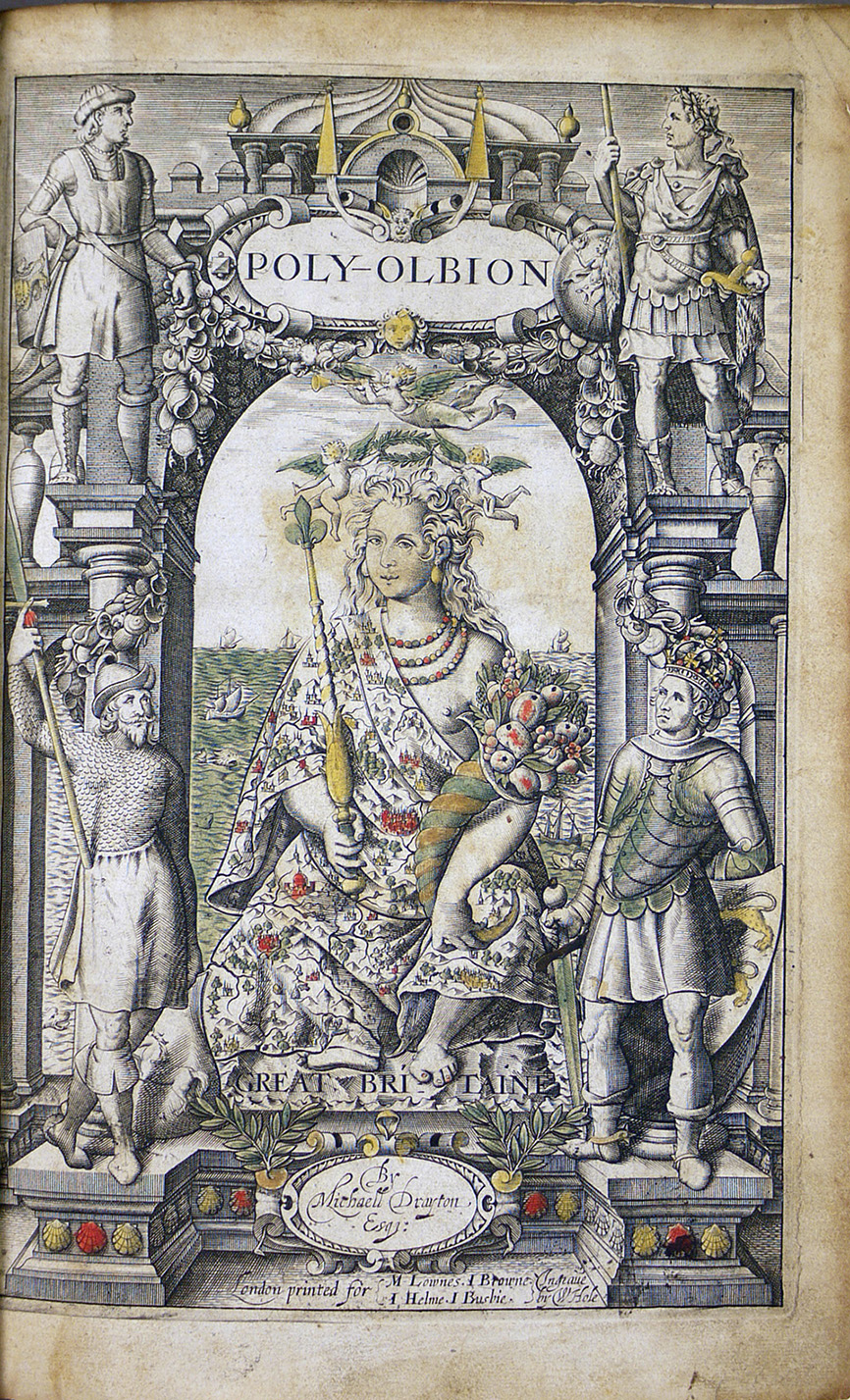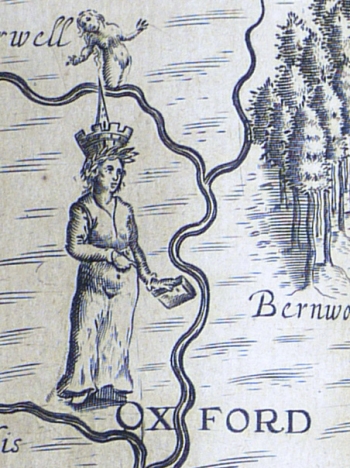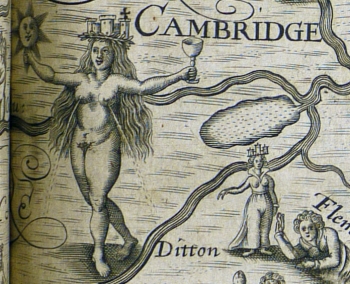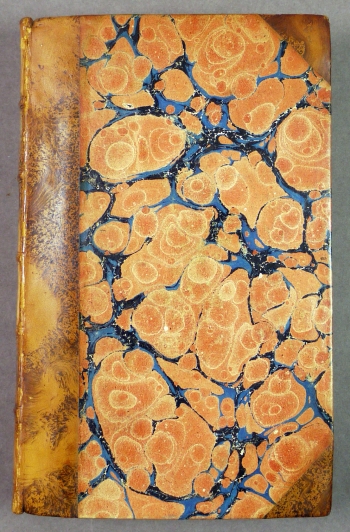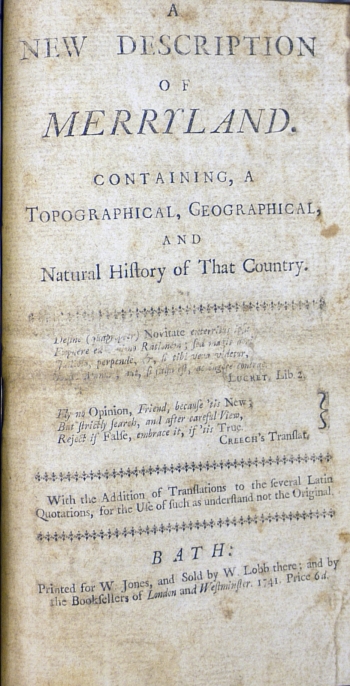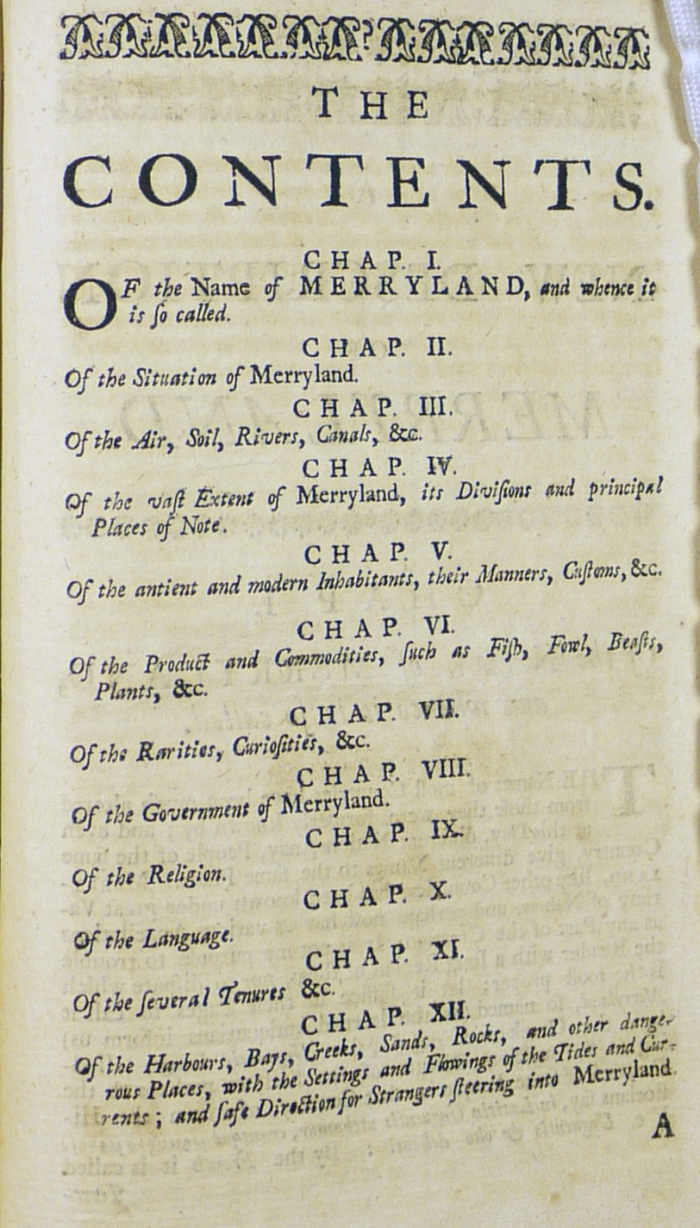By the Windward Passage
Michael Drayton’s poem Poly-Olbion offers a descriptive journey through England and Wales; its first part was published in 1612, its second in 1622. The poem’s twenty-first ‘song’, one of that second edition's new pieces, makes reference to Cambridge, first in the summarising argument:
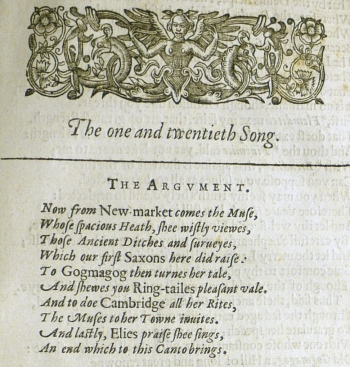 Now from New-market comes the Muse,
Now from New-market comes the Muse,
Whose spacious Heath, shee wistly views,
Those Ancient Ditches and surveyes,
Which our first Saxons here did raise:
To Gogmagog then turns her tale,
And shewes you Ring-tailes pleasant vale.
And to doe Cambridge all her Rites,
The Muses to her Towne invites.
And lastly, Elies praise shee sings,
An end which to this Canto brings.
It might be missed through the large amount of syntactic inversion that the female figure throughout this argument is ‘the Muse’: Cambridge is ‘her Towne’, and she invites ‘the [other] Muses’ to join her there. While Oxford is described in the fifteenth song as also welcoming ‘all the Muses’, it is not taken as being home to any of them; and it is notable that in William Hole’s illustrations to the poem, the two are depicted rather differently.
If a value judgement is implicit in this difference, it is difficult to know which location is being favoured; it is notable that the nakedness of the lactating Cambridge figure positions her as emphatically female, as prompted by the text: ‘In womans perfect shape, still be thy Embleme right, | Whose one hand holds a Cup, the other beares a Light.’ Positive as this superficially is, one would be justified in finding something reductive here: as in the representation of Great Britain (sadly not ‘Polly Olbion’) on the title page, the ‘perfect shape’ of the woman-city or the woman-country is objectified through being mapped.
That said, Drayton and Hole’s conflation of the female body and the geographical location is inoffensive in comparison to a rather seedier item in the Library’s collections: a 1741 printing of Thomas Stretzer’s pamphlet A New Description of Merryland.
Bound with eight other items (including a verse description of Bristol and a guide to women’s ailments) in a volume bequeathed to St John's by Fellow and physician Thomas Gisborne, A New Description of Merryland is something of a sleazy cousin to Poly-Olbion or to More’s Utopia: part of an eighteenth-century pornographic niche, it is a description of the female human body as if it were a geographical and cultural landscape, with particular reference to a specific region.
A basic summary of the pamphlet might be: human beings have genitalia, and that’s hilarious. There are some decorative flourishes, as Strezter considers Merryland’s name, geology, climate, population and so forth, but the joke is what it is. If the basic premise sounds amusing, the entire text is worth a read if only as an endurance test; in all seriousness, any reader who finds the idea fundamentally distasteful might wish to stop reading this Spotlight now, before the liberal quotation begins.
This is from the introductory stages:
Know then, courteous Reader, soon after my first Entrance into this wonderful and delightful Country (having as prying a Curiosity as most Men) I endeavoured to get the best Insight that was possible into every Thing relating to the State of Merryland […] Among other things I made very accurate Observations both of the Latitude and Longitude, and may venture to say, there could be no considerable Mistake in my Observations, as they were made with a proper Instrument, of a large Radius, and in perfect good Order; nay, I have been assured, when I was in Merryland, that my Instrument was inferior to none: but some Years later, happening to be there again, and repeating the Experiment I found both Latitude and Longitude increased many Degrees, tho’ I tried in the same Spot, and with the same Instrument as before.
That Stretzer, about whom not much is known, published the book initially under the name Roger Pheuquewell should confirm suspicions that he was familiar with the notion and value of subtlety but unwilling to let it govern his life. Once a reader has noticed the pamphlet's conceit, the entendre barely qualifies as double:
The Climate is generally warm, and sometimes so very hot, that Strangers inconsiderately coming into it, have suffered exceedingly; many have lost their Lives by it, some break out into Sores and Ulcers difficult to be cured; and others, if they escape with their Lives, have lost a Member. [...] There is a spacious Canal runs through the midst of this Country, from one End almost to the other; ’tis so deep that Authors affirm it has no Bottom. I have often founded it in many Parts, and tho’ I don’t doubt but it has a Bottom, I must own I never could reach it; perhaps, had my Sounding-line been a few Fathoms longer, it might have reached the Bottom.
Tedious as this is on one level, on another one might bring oneself to admire Stretzer’s tenacity or temerity as he plays variations on his obvious theme. In discussing different facets of Merryland (whose associated place names include 'Lba', 'Cltrs' and other such scrutable inventions), he manages to acknowledge various biological and social roles performed by women's bodies by and men's relationship with same, altering his approach as his chapter headings permit or demand.
Here he is, for example, on pregnancy:
Among the Rarities, may likewise justly be reckoned that wonderful Mountain on the Confines of Merryland, which at some Seasons begins to extend its Dimensions both in Height and Bigness, and increases its Bulk so considerably, that it is esteemed one of the most admirable Works of Nature […] There are two other pleasant little mountains, called Bby […] on the Top of each is a fine Fountain, that yields a very wholesome Liquor much esteemed […] they seldom fail to run plentifully after the Swelling of the other Mountain aforementioned, and they have in some Degree the same Faculty of rising and falling[.]
On contraception and abortion:
'Tis a lamentable Thing for a Man to have a large Crop, when his Circumstances can't afford Houses to keep it in, or Thatch to cover it; to let it perish would be infamous, and what can a poor Man do? for he can't dispose of it immediately, it must be kept several Years at great Expence to him, before 'tis fit for the Market, or capable of making the least Return for his Labour and Expence. [...] This Peculiarity has put some People on inventing Means to prevent the Seed taking Root, or to destroy it before it comes to Maturity; but such Practices are only used by Stealth, and not openly approved of; it is looked on as a bad Practice, and we are told it was formerly punished with Death.
On prostitution:
And for Merchandizing, the great Wealth arising from Trade in some Provinces is a plain Proof and Demonstration that Traffick is carried on in Merryland with great Success.
On incest:
One remarkable Custom of the Natives is, that the moment they come into the World, they leave the particular Spot they were born in, and never after return to it, but wander about till they are 14 or 15 Years old, at which Age they generally look out for some other Spot of Merryland, and take possession of it the first Opportunity; but to enter again in that Part they were born in, is looked on as an infamous Crime, and severely punishable by Law; yet some have been hardy enough to do it.
There is satire of sorts, just about audible over the sound of Strezter slapping himself on, one trusts, the back:
We have had Ministers, who preferred its welfare to that of their own Country, and Bishops who would not be displeased to have a small Bishoprick in Merryland.
Indeed, for all the supposed focus on the female anatomy, matters pertaining to the Instrument remain of predictable importance to the author, who, in this extract discussing a particular creature fond of the Merryland canal, also implies some autobiographical detail:
They are of different sizes, from six to seven or eight Inches in Height, when full grown, and from four to six in Circumference; there are some indeed of much larger Dimensions, but very rarely to be met with; and there are others much less, but they are of little or no Value; those of a middling Size are observed to be more lively and vigorous than the larger Sort, who like the Grenadiers in a Regiment, are not able to make so long and frequent Marches as the Battallion Men, the latter being for the most part better set and nimbler, as being furnished with a greater Plenty of Spirits.
As the pamphlet continues, the author - or 'the author', if this is Stretzer writing as Pheuquewell and building up a comic persona - becomes more opinionated:
Merryland may be said to be entirely under Female Government, there being an absolute Queen over each particular Province, whose Power is unlimited; no Tyrants ever having required a more servile and blind Submission than the Queens of Merryland. [...] There are numberless Instances of the vast Power of these Queens, the Conquests they have made, and the many cunning and crafty Methods they have used to obtain their Ends […] Few of these Queens but have some Favourite or prime Minister, and when they are well satisfied with his Abilities and Behaviour, they will suffer themselves to be governed in a great measure by his Advice; but alas! there are some, who, tho’ they have abundance of able Ministers, will never be ruled by any of them, are always varying and changing, turning out their greatest Favourites, for no other Reason in the World, but to shew their Power, and gratify their inconstant Tempers, admitting a new Favourite every Day, as if Variety was their greatest Delight.
Strezter/Pheuquewell is unimpressed with how unimpressed women have been with him. This means, happily, that he can speak from experience when giving relationship advice. He has found it important, when travelling to Merryland, to bide one's time and pick one's moment:
But if you find rough and tempestuous Weather, as sometimes happens at touching at Bby, and the Tide strong against you, it is best to lie-by, till the Storm is appeased, and a fairer Prospect offers of a prosperous Voyage; nor should you be discouraged by every little Squall which you may meet with at this Place, for generally these Squalls, tho’ they seem violent at first, soon blow over without much Damage.
In his view, alternative travel arrangements have little to recommend them:
There are people who […] incline sometimes to go about by the Windward Passage, but this I do not so well approve; in some Circumstances indeed it may be convenient but I believe it is commonly done more for sake of Variety than Conveniency.
And he believes that, while one should aspire to anchor well upon arrival, one must also be realistic:
The chief thing is, to beware of anchoring in foul Ground; for here is some much gruffer than others, and a great deal so very bad, that it will soon spoil the best of Cables; the sandy or grey Ground are not good to anchor in, the brown is best, in my Opinion: But as People cannot always have their Choice, they must be contented with such as they can get.
Perhaps they must.
In the Cambridge portion of Poly-Olbion, Drayton has the (female) River Cam speak up for poets, and against their detractors:
My Invective, thus quoth she, I onely ayme at you,
(Of what degree soe’r) ye wretched worldly crue,
In all your brainlesse talke, that still direct your drifts
Against the Muses sonnes, and their most sacred gifts,
That hate a Poets name, your vilenesse to advance,
For ever be you damn’d in your dull ignorance.
Slave, he whom thou dost thinke, so meane and poore to be,
Is more then halfe divine, when he is set by thee.
Nay more, I will avow, and justifie him then,
He is a god, compar’d with ordinary men.
Drayton and the Cam hardly have in mind Strezter's brand of prose, or even such versified bawdiness as (Johnian) Thomas Nashe's The Choise of Valentines. And yet Drayton's feminising of geography arguably has the disadvantage of being less self-aware than Stretzer's version of same. Cognizance of one's failings does not excuse them. Knowing that one is writing degrading material does not eliminate the degradation. But does it lessen it? If a writer is knowingly reductive, objectifying, pornographic, is the resulting work defensible insofar as it is direct about the realities of its enterprise and of its audience's demands?
Give me those Lines (whose touch the skilfull eare to please)
That gliding flow in state, like swelling Euphrates,
In which things naturall be, and not in falsely wrong:
The Sounds are fine and smooth, the Sense is full and strong,
Not bumbasted with words, vaine ticklish eares to feed;
But such as may content the perfect man to read.
One might feel far from perfect when reading Stretzer's pamphlet. That the sense is 'full and strong', however, is hard to deny.
This Special Collections Spotlight article was contributed on 14 February 2017 by Adam Crothers, Library Assistant, who would like to point out that this is only the second of his Spotlights to talk about pornography in any detail.
